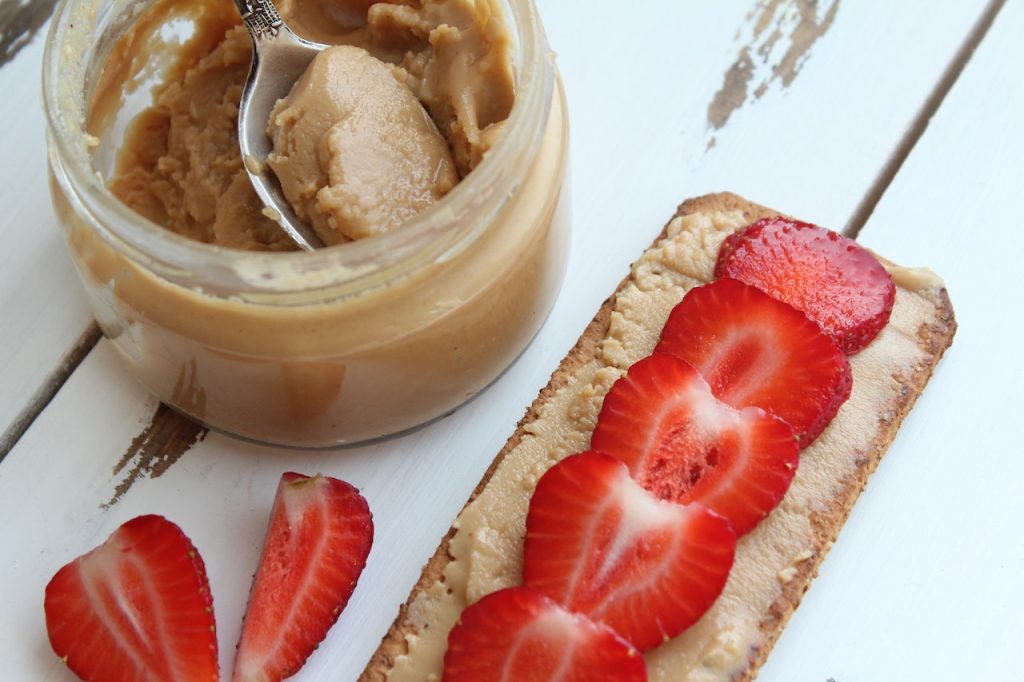Sports Nutrition News You Can Use
Staying on top of the latest sports nutrition news can be a full-time job. Between conferences, webinars, and journal articles, I learn a lot of information that I like to translate into practical tips to share with athletes, like you! Enjoy this news you can use! (The research was presented at the International Sport & Exercise Nutrition Conference in the UK.)
If you try to “stay away” from peanut butter, deeming it to be fattening, think again! Peanut butter—and peanuts in any form—contribute to no more weight gain than the same number of calories from carbohydrate-rich snacks. In a 10-week weight-gain study that included lifting weights three times a week, 28 athletic women and men (average age, 25.) consumed:
— an extra 500 calories of peanuts and peanut butter-based snacks, or
— an extra 500 calories of peanut-free carb-based snack foods (such as pretzels, fruit chews, bagels).

The carb-snackers gained about 6 pounds; the peanut eaters gained only about 3.5 pounds. How could this be?
One explanation is the fiber and fat in peanut butter is satiating. That means, it keeps you feeling fed for longer than fat-free foods, such as pretzels. Peanut butter can curb your appetite, so you end up eating fewer calories overall for the day.
This study helps confirm why I vote peanut butter to be one of the best sports foods around (assuming you are not allergic to it)! Peanut butter requires no refrigeration, is anti-inflammatory, nutrient rich, inexpensive, and most importantly, yummy. How about enjoying more peanut butter on bananas for your morning and afternoon snacks?
When an athlete goes on a low-carb / low-calorie diet, their bones also go on a diet. In a study with 327 runners (ages 18-35) who trained 8 or more hours a week, those who restricted carbs and/or trained without having first eaten, experienced 1.5 times more bone injuries More research is needed to learn how carbs and calories can influence bone health. In the meantime, enjoy carb-based grains, fruits and veggies at every meal.
With global warming, athletes who exercise in the heat should take steps to prevent problems related to elevated body temperature. One tip is to pre-cool your body prior to exercise. Try drinking ice water or slushies, or suck on ice chips. Doing so might help you have greater endurance.
A study of professional female soccer players reports they burned about 2,900 calories per day. Of that, about 1,400 calories supported their resting metabolic rate (calories needed to be alive) and about 1,200 calories were burned during exercise, the rest supported general daily activities. This equates to about three 700 to 800 calorie meals per day plus two 200 to 300 calorie snacks. That’s a lot of food! For athletes who may wonder, Why do I feel hungry all the time?, the answer might be because your body is hungry!
When female athletes undereat, they commonly stop having regular menstrual periods. When male athletes undereat, they experience hormonal changes that can lead to loss of sex drive. In a study with 10 healthy, active males (25 years.) who strictly dieted for five days—they ate less food and exercised more—the calorie deficit caused significant physiological changes. The men lost about 6 pounds (losing more muscle than fat, as happens with quick weight loss). Their thyroid hormones dropped, as did their testosterone levels.
Restrictive dieting not only reduces calorie intake, but also intake of protein, calcium, iron, zinc, and many other valuable nutrients needed to maintain optimal health and performance. Don’t consciously restrict your eating and stop eating at meals just because you think you should. Listen to your body; stop eating because you feel content, not just because the food is gone.

Athletes in endurance sports (such as runners, triathletes) and jumping sports (such as basketball and volleyball players) prefer to be light to enhance their performance. The problem is long-term restrictive eating can contribute to health issues. In a study comparing weight-conscious male athletes (age 24.) to a group of fitness exercisers, the athletes were leaner, but they had lower levels of thyroid hormone (a sign they were conserving energy). They also had weaker bones. If you skimp on food to be lean, your best bet is to seek guidance from a registered dietitian (RD) who specializes in sports dietetics (CSSD). This professional can help you healthfully achieve your weight goals. Use the referral network at eatright.org to find your local sports dietitian.
Personal trainers commonly believe they should have a “perfect” physique to achieve success in their careers. This can put them at high risk for developing eating disorders and disordered eating. Among personal trainers who responded to recruitment messages on Twitter and Instagram, 15% reported high levels of disordered eating behaviors (binge-eating, restrictive dieting, over-exercising). Sadly, these trainers are seen as role models. We need authentic fitness leaders who represent a variety of sizes and shapes the average exerciser can attain and maintain. Don’t be fooled; a “perfect body” generally comes with a high cost.
Some women gain “belly fat” at the time of menopause. This might be related to midlife lifestyle changes and aging, as well as to hormonal shifts. Peri-menopausal women who had big dinners and snacked frequently at the end of the day tended to have more belly fat than those who front-loaded their calories. One suggested weight management solution (for both women and men) is to eat less at night. A satiating high-protein breakfast can help reduce the urge to overeat at the end of the day. Peanut butter on a bagel with a side of Greek yogurt, anyone?
Nancy Clark MS RD CSSD counsels both fitness exercisers and competitive athletes in the Boston-area (Newton; 617-795-1875). Her best-selling Sports Nutrition Guidebook is a popular resource, as is her online workshop. Visit NancyClarkRD.com for info.

